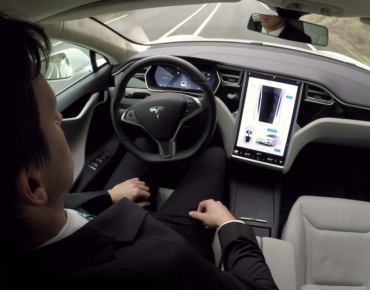Tesla, Samsung Expected to Partner on Self-Driving 5nm Chip

via Shutterstock
Samsung Electronics is said to be partnering with electric vehicle leader Tesla on a leading-edge 5-nanometer chip design that would serve as the core of an emerging self-driving car capability.
According to reports out of South Korea, Samsung (KRX: 005930) is skipping a semiconductor processing node to produce a 5nm automotive chip for Tesla (NASDAQ: TSLA). According to the Korean website Asiae, Samsung is shifting manufacturing resources from its advanced driving assistance system (ADAS) operation to its vehicle infotainment product. It is there, the report notes, that neural networking and other advanced processors are increasingly used to handle sensor data while enabling vehicle-to-vehicle and secure network communications.
Moreover, the report out of Seoul asserts that Samsung is bypassing the current 7nm process node in a bid to challenge foundry rival Taiwan Semiconductor Manufacturing Co. (NYSE: TSM) as both vie for a larger slice of the nascent automotive semiconductor market.
A partnership with Tesla would allow Samsung to ramp production of bleeding-edge 5nm chips based on its extreme ultraviolet process technology, boosting wafer yields as fabrication scales.
Previous versions of Samsung’s automotive chips at the 14nm node used the chip giant’s argon fluoride process technology, the Korean website reported this week.
The advanced chips would reportedly support Tesla’s “4D” sensing capabilities underpinning its autopilot and “full self-driving” (FSD) sensor suite. Among the components is a millimeter-wave radar. According to Electrek.com, Tesla recently filed an application with the U.S. Federal Communications Commission to use the new radar in future versions of its electric vehicles.
The FSD suite is intended for navigation and to detect other vehicles and pedestrians.
Tesla has yet to respond to our request for comment.
Those self-driving features would require predictive analytics and inference capabilities that would presumably be handled by the new Samsung processor. The 5-nm device would also manage a range of vehicle components, including displays and memory. Similarly, the additional performance gains would support future 6G wireless networks that, among other capabilities, would allow vehicle-to-vehicle and roadside communications.
Samsung’s aggressive move into the automotive electronics also reflects heightened competition among chip makers as electric vehicle makers like Tesla push self-driving technologies into the mainstream. The potential for volume production of automotive chips would help foundry leaders like Samsung and TSMC finetune leading-edge process technologies, thereby boosting wafer yields.
TSMC released the first 7nm automotive design platform last May, touting it as a way to accelerate chip designs for applications like AI inferencing engines, ADAS and other autonomous driving applications.
“With the advent of ADAS and autonomous driving, powerful and efficient computing is now also required to enable AI inferencing engines to perceive the road and understand traffic to help drivers make split-second decisions,” Cliff Hou, TSMC’s senior vice president for R&D, noted in unveiling the 7nm platform.
Related
George Leopold has written about science and technology for more than 30 years, focusing on electronics and aerospace technology. He previously served as executive editor of Electronic Engineering Times. Leopold is the author of "Calculated Risk: The Supersonic Life and Times of Gus Grissom" (Purdue University Press, 2016).











